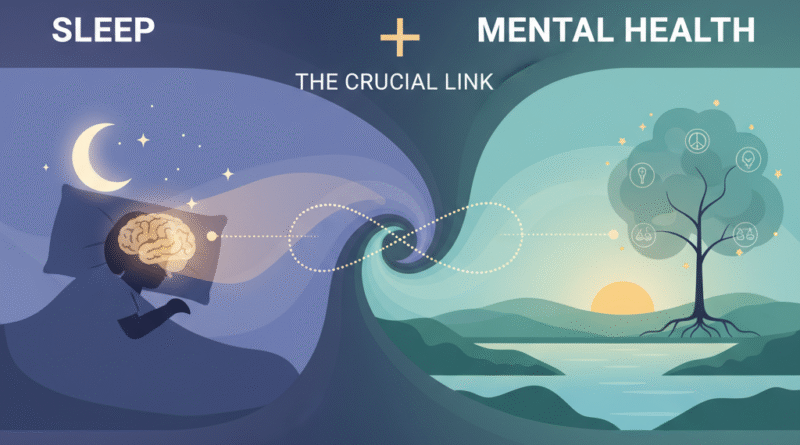The Link Between Sleep and Mental Health
The Link Between Sleep and Mental Health
Introduction: Why Sleep is Non-Negotiable for Your Mind
You often hear about diet and exercise, but have you truly considered the crucial role of sleep? Therefore, understanding the link between sleep and mental health is paramount in today’s demanding world, especially for students. As a result, many of us perhaps you included underestimate just how much our nightly rest impacts our daily emotional and cognitive state. Moreover, when we consistently shortchange our sleep, we are essentially setting the stage for unnecessary emotional turbulence. Consequently, making small, conscious changes to improve your sleep quality can deliver profound benefits for your overall mental wellness. In addition, this guide will explore the science behind this connection and offer practical ways to enhance your sleep life.
The Scientific Connection: What Happens While You Sleep?
Sleep is not merely a passive state of rest; rather, it is a highly active period of restoration and crucial maintenance for your brain. To begin with, during sleep, your brain works tirelessly, processing the day’s information and consolidating memories. Moreover, this is when emotional regulation gets a vital tune-up. Consequently, sleep deprivation significantly hinders the prefrontal cortex the part of the brain responsible for logical reasoning and controlling impulsive reactions. Therefore, a lack of adequate rest makes you much more vulnerable to stress, anxiety, and sudden mood swings.
Sleep Quality and Emotional Regulation
Poor sleep quality, or fragmented sleep, affects your ability to manage negative emotions. For instance, studies consistently show that individuals with chronic insomnia or poor sleep hygiene report higher levels of irritability and emotional reactivity. In addition, during deep sleep, your brain clears out metabolic waste products, a process thought to be critical for long-term brain health and stability. As a result, prioritizing a full cycle of restorative rest is key to maintaining a balanced and resilient mood. Therefore, better sleep and mental health are two sides of the same coin.
The Two-Way Street: Mental Illnesses and Sleep Disturbances
The connection between sleep and mental health is a complex, bidirectional relationship. Specifically, while lack of sleep can negatively affect your mental state, various mental health conditions can, in turn, severely disrupt your ability to sleep.
Anxiety and the Racing Mind
Anxiety disorders are frequently accompanied by difficulty falling asleep or staying asleep. Therefore, a cycle often develops: the anxiety makes it hard to relax and drift off, and consequently, the resulting lack of sleep quality exacerbates the anxiety the following day. Moreover, this leads to a heightened state of alertness and an inability to “turn off” the mind at night. Thus, addressing the underlying anxiety is often as important as improving sleep hygiene. In addition, consistent sleep deprivation can make the symptoms of an existing anxiety disorder much more severe.
Depression and Sleep Patterns
Depression often manifests with significant changes in sleep patterns. For example, some individuals with depression experience insomnia—trouble sleeping—while others suffer from hypersomnia, which is excessive sleeping. As a result, the quality of this sleep, even when prolonged, is often poor and unrefreshing. Therefore, treating the sleep disturbance, along with the depressive illness itself, is a vital part of the recovery process. Moreover, improving sleep quality is a crucial benchmark for measuring recovery from depressive episodes, further solidifying the core link between sleep and mental health.

Actionable Tips for Better Sleep Hygiene and Mental Wellness
Fortunately, you have significant control over your sleep hygiene, which is the set of habits and practices conducive to sleeping well. Therefore, integrating these actionable steps can drastically improve both your nightly rest and your daily mental wellness.
Establish a Consistent Sleep Schedule
The most important step is maintaining a regular bedtime and wake-up time, even on weekends. Furthermore, this consistency helps regulate your body’s natural circadian rhythm. As a result, your body knows when to expect sleep, making it easier to fall asleep and wake up naturally. Moreover, try to stick to this schedule within a 30-minute window for optimal results.
Optimize Your Sleep Environment
Your bedroom should be a sanctuary for rest. To achieve this, ensure your room is dark, cool, and quiet. In addition, blackout curtains can block out external light, and a white noise machine can help mask disruptive sounds. Therefore, your physical surroundings play a considerable role in signaling to your brain that it is time to switch off. Consequently, investing in a comfortable mattress and pillows is also beneficial for maintaining excellent sleep quality.
Implement a Relaxing Pre-Sleep Routine
Avoid stimulating activities, such as intense exercise or heavy studying, close to bedtime. Instead, create a relaxing ritual in the hour before sleep. For example, this could involve reading a physical book, taking a warm bath, or practicing gentle stretching. Moreover, crucially, you must ditch the screens—that means phones, tablets, and laptops. As a result, the blue light emitted by these devices suppresses melatonin, the hormone that tells your body it is time to sleep. Therefore, reducing screen time is one of the quickest ways to improve your sleep hygiene and combat sleep deprivation.
Mind Your Diet and Stimulants
Be mindful of what you consume, particularly in the evening. Specifically, limit caffeine and nicotine, especially several hours before bedtime, as they are stimulants that interfere with the sleep process. In addition, while alcohol may initially make you drowsy, it severely disrupts the quality and restorative stages of your sleep later in the night. Therefore, a light snack is fine, but avoid large, heavy meals close to when you plan to sleep. Consequently, conscious consumption habits powerfully support your goal of improving sleep and mental health.

Your Takeaway for Lasting Mental Wellness
The message is clear: the link between sleep and mental health is non-negotiable and fundamental to your overall well-being. Therefore, view sleep not as a luxury or a time-waster, but as a proactive, critical investment in your emotional stability and cognitive performance. In addition, by making small, consistent improvements to your sleep hygiene, you are actively building resilience against stress and anxiety. As a result, you will find yourself better equipped to handle the demands of student life and achieve a higher level of mental wellness. Consequently, start tonight: prioritize your rest, and watch the positive impact flow into every area of your life.




